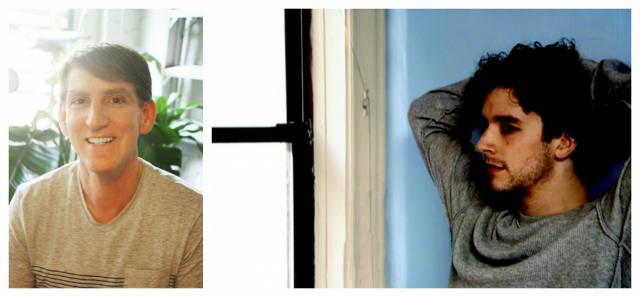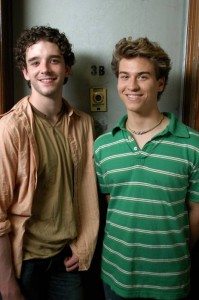

Shortly before 9/11, playwright Brian Sloan placed an ad looking for a roommate. Little did he imagine how much his neighborhood would change in just an instant. Inspired by the responses he got on his ad, he wrote a play called WTC View, in which a young photographer called Eric (played by Michael Urie) receives visits from potential roommates, all of whom bring different outlooks on the changing New York cityscape. After an Off-Broadway run, the play was turned into a film directed by Sloan, in which Urie reprised his role as Eric.
After being out of circulation for a few years, WTC View is finally being released on iTunes and other digital platforms. We talked to writer/director Sloan who looked back at the many versions of the piece and talked about casting Michael Urie.
I read the original ad that you placed, and one of the things that you specified in it was that you wanted no students, and yet in the movie the scene with the student Max (Jay Gillespie) was my favorite! Did you have a bunch of students show up at your door in real life, despite your warning?
(Laughs) I did have a couple students show up, my roommate search actually went on a bit longer than Eric’s in the play. It took me until the end of October to find a roommate for that apartment, so I’m pretty sure I placed another ad a week or two later and dropped the “no students” bit, cause I wasn’t getting enough people. It was a really difficult time to find a roommate, I’d been living in that apartment for a decade and I’d had other roommate searches before and they usually lasted about a week. In New York location is king, so people would snap up a room in the village, but this time it took me almost two months, which was strange.
I liked the scene with the student because it forces Eric to go out of his funk.
Yeah, it definitely was one of the more fun scenes to write, because it really had a different energy than a lot of the other scenes. Max’s perspective was new and it might be what the perspective might be for someone younger, after this terrible thing happens, he’s still optimistic, excited...it’s a great reminder of what Eric might’ve been like in his college years. I remember in the initial draft of the play, I was thinking a lot more theatrically about how the play might unfold and my initial concept was that this character would be a younger version of Eric who comes visit him, in a more meta kind of way. I ended up doing something else, but in a way that aspect remains, Max is a younger version of Eric coming and trying to nudge him out of the state of depression he’s in.

I kept thinking that all the people who came to see the room in a way were versions of Eric who he never got to be.
It’s interesting, I was reviewing a lot of my notes for the original play and at one point we wanted to have one actor play all these people who come see the apartment. Part of that was because of the technical problems of casting a large play, a three actor play is easier to produce, but also in a thematic way, these people who come to visit are different versions of the same character. In the end what I wanted to do was create a realistic look at what New York was after 9/11 and I thought if I had one actor portray all these roles it would seem very false and would take people out of this reality.
You did the show originally in 2003, the film in 2005 and you revived the show in 2011. Did the movie in any way affect your revisions for the revival?
There were some revisions for the revival but I don’t know if they were made because of the film, it was more like looking at the play and doing minor adjustments to fix a scene. Changing a line here and there, some trimming, we’d done a lot of trimming from stage to screen, the film is about twenty minutes shorter than the play. Anytime a writer has a chance to revise, he’s gonna go for it. There’s that saying in Hollywood, that a movie is finished when they take it away from you, they take it out of the editing room as you’re screaming, that’s when the movie’s done (laughs).
A few years ago I saw August which you co-wrote, and after watching WTC View, I found it interesting how they both touch on the process of grieving. What attracts you to these themes?
I’d seen Eldar Rapaport’s short film on which he based the feature, and I was interested in the short because of the lost chances between these two characters who had once been a couple and who realize the spark is still there. I guess now that you mention it, it’s kinda similar to what’s happening to Eric and his boyfriend in WTC View, I guess I’ve always been interested in romance, how did this happen, how did that not happen? How all the variables play out.
Can you talk a bit about casting Michael Urie?
Michael was cast in the play originally, we were trying to cast an actor for the play in the Fringe Festival and there wasn’t a lot of money, so we couldn’t hire someone with a lot of experience. The challenge in the play is that the lead actor is onstage during the whole show, so we needed to have an actor who would be able to sustain that performance for two hours. We knew we needed somebody with stage experience, I’d seen Michael in a play my friend directed the previous year, and I also knew Michael went to Juilliard, so fortunately the timing was great. Michael had just graduated and he was available, he was a bit younger than Eric which the director pointed out. Michael read the script and I thought he was perfect, but I didn’t know he was nine years younger than Eric, but we figured a Juilliard actor would be able to play older (laughs). When you’re casting a certain age, it’s not as important who you cast in that role, but who you cast around them, so the people around them don’t look much older or younger.
When you first made the play you mentioned you were afraid it was happening too soon after 9/11, do you still think there is such a thing as “too soon”?
I think at the time we were concerned with how audiences would take the play, but those concerns evaporated the minute we brought a live audience to our first show. There was one line I was concerned about before we had an audience, in which Eric says he’ll keep smoking as long as ground zero keeps smoking, so we were wondering if this would be too much for the audience. The first time we had an audience and that line came up, people laughed. I think the humor in the play and the movie made the material accessible, I never wanted this to play out like a funeral, I wanted it to represent what it was like to live in the city at the time; there were moments of sadness but there were also moments of laughter. There was a strange energy in the city, like a survivor’s state of mind. It wasn’t all mourning and sadness and that’s what the film is trying to show.
WTC View is now available on iTunes and other digital platforms.